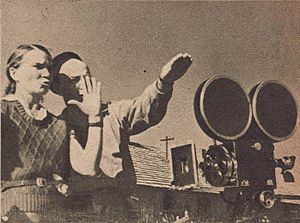Wanda Jakubowska facts for kids
Quick facts for kids
Wanda Jakubowska
|
|
|---|---|
 |
|
| Born | 10 November 1907 |
| Died | 25 February 1998 (aged 90) |
| Occupation | Film director |
| Years active | 1932–1988 |
Wanda Jakubowska (born November 10, 1907 – died February 25, 1998) was a famous Polish film director. She made 15 films in over 50 years. But she is most famous for her movies about the Holocaust. Her 1948 film, The Last Stage, was one of the first and most important movies about concentration camps. She filmed it at Auschwitz, a real concentration camp where she was once held as a prisoner. Wanda Jakubowska believed strongly in Communism. Her films often shared her political ideas.
Contents
Early Life and Film Beginnings
Wanda Jakubowska was born on November 10, 1907. Her parents were Wacław and Zofia. Her father was an engineer. He served in the Imperial Russian Army during World War I. Wanda's family moved to Moscow while her father was in the army. They came back to Poland in 1922 after her mother, Zofia, passed away in 1917.
Wanda finished high school in 1928. She earned a degree in Art History from the University of Warsaw in 1931. Wanda loved cinema from a young age. She started a film club for people who liked movies. Many future Polish thinkers were part of this group. Aleksander Ford and Jerzy Toeplitz were some of the early members.
Through her film club, Wanda found chances to work on early Polish films. She also got to direct her own movies. One of her most famous early works was The Sea. This short film was nominated for an Academy Award. This made her the first female director ever nominated for an Oscar. She also made a movie based on the book Nad Niemnem. This film was supposed to be released in 1939. But World War II started, and the film was lost or destroyed before anyone could see it.
Life as a Prisoner
After the invasion of Poland in 1939, Wanda joined a secret resistance group. This group was called the Polish Socialist Party. The Gestapo, which was the German secret police, arrested Wanda on October 30, 1942. She was first arrested because a neighbor had hidden weapons. Wanda was held in Pawiak prison. There, the German authorities found out about her secret group activities.
On April 28, 1943, Wanda Jakubowska was sent to Auschwitz. When she arrived, she was given a tattoo with the number 43513.
Wanda worked at a smaller camp near Auschwitz called Rajsko. This camp was mostly a garden and plant research center. Most prisoners there were well-educated. Many of them were also communists. Dr. Joachim Caeser was in charge of this camp. He was unusually kind and treated some prisoners like colleagues. Wanda's job was to take pictures of plants for research. Her time at Rajsko was very different from what she showed in her film The Last Stage. Her experiences at Auschwitz-Birkenau and later Ravensbrück concentration camp were more like the film.
In October 1944, the German authorities found out Wanda was still in contact with the resistance. They moved her from Rajsko to Birkenau. Wanda was later sent to Ravensbrück. This was just 10 days before the Red Army reached Auschwitz. The Nazis also tried to move prisoners from Ravensbrück. But Soviet soldiers freed the group of prisoners, including Wanda, on April 28, 1945.
While at Auschwitz, Wanda became friends with Gerda Schneider. Gerda was a German political prisoner. She became a Blockälteste, which was like a kapo. A kapo was a prisoner who was given special duties by the guards. People have different stories about Gerda's behavior at Auschwitz. Some say she was a good person, while others say she hurt other prisoners. After the war, Gerda and Wanda wrote the movie script for The Last Stage together.
Filmmaking Career
After the war, Wanda Jakubowska moved to Łódź. Her old friend, Aleksander Ford, was now in charge of a film company called Film Polski.
In 1948, Wanda released her film The Last Stage. Parts of the movie were filmed at the real Auschwitz concentration camp. The film was based on her own experiences as a prisoner there. She said that thinking about how she would document her experiences helped her survive Auschwitz.
Wanda Jakubowska made two more films about concentration camps. These were Meetings in the Twilight (1960) and The End of Our World (1964). She thought The End of Our World was her best film. But neither of these movies were widely seen. This was probably because they strongly supported communist ideas.
Wanda Jakubowska also taught as a professor. She worked at the National Film School in Łódź from 1949 to 1974.
Awards and Recognition
- Grand Prix – Crystal Globe for The Last Stage at the 3rd Karlovy Vary International Film Festival in 1948.
- International Peace Prize for The Last Stage in 1950.
See also
 In Spanish: Wanda Jakubowska para niños
In Spanish: Wanda Jakubowska para niños
 | Jackie Robinson |
 | Jack Johnson |
 | Althea Gibson |
 | Arthur Ashe |
 | Muhammad Ali |

